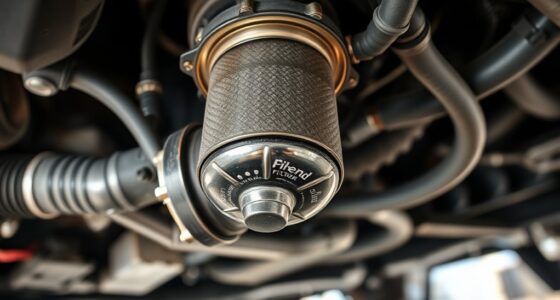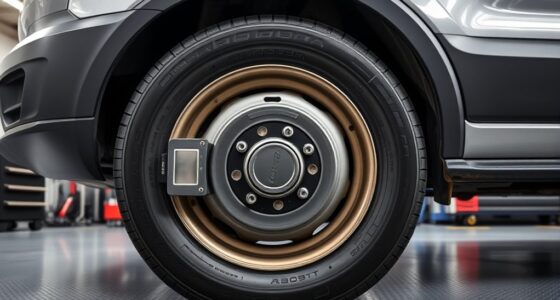To effectively handle AdBlue/DEF for your transit diesel, always use high-quality fluid from reputable sources and store it properly away from heat and sunlight. When filling your vehicle, locate the dedicated fill port and pour slowly to prevent spills, then tighten the cap securely. Keep an eye on the level and address warning signals promptly. Using contaminated or degraded fluid can harm your emission system—continue exploring for more detailed tips on safe filling and maintenance.
Key Takeaways
- Use the designated fill port, separate from diesel, and pour AdBlue slowly to prevent spills.
- Ensure AdBlue quality by choosing high-purity, reputable products before purchase and before storage.
- Store AdBlue in a cool, dry place away from heat, sunlight, and contaminants to prevent degradation.
- Regularly monitor AdBlue levels, refill before warning alerts, and avoid diluting or mixing with other fluids.
- Be alert to dashboard warnings; promptly address low AdBlue and avoid running out to maintain emission system compliance.

Are you aware of how AdBlue or Diesel Exhaust Fluid (DEF) plays an essential role in keeping your Transit diesel vehicle compliant with emission standards? If you’re driving a diesel Transit, understanding how to properly handle AdBlue is a key.
This fluid is specifically designed to reduce harmful NOx emissions, helping your vehicle meet environmental regulations. When it’s time to refill, make sure you do it carefully to prevent contamination or damage. Always use the correct type of AdBlue, which is a high-purity urea solution, and avoid mixing it with other fluids or using anything that looks discolored or contaminated.
Filling your DEF tank is straightforward, but precision matters. Locate the dedicated fill port—usually marked and separate from your diesel fill point—and pour in the fluid slowly to avoid spills. Keep the tank cap tightly sealed after refilling to prevent evaporation or contamination from dirt and debris. It’s best to use a clean, dedicated container if you’re transferring AdBlue from a larger drum to ensure purity. Be cautious not to overfill; most vehicles have a sensor that will alert you if the tank is full, but keeping an eye on the level helps prevent spills.
Quality is essential when it comes to AdBlue. Low-quality or contaminated fluid can cause your vehicle’s emission system to malfunction, leading to costly repairs or even engine shutdowns. Always buy from reputable suppliers, and check the expiration date before purchasing.
AdBlue can degrade over time, especially if exposed to heat or direct sunlight, so store it in a cool, dry place. If you notice any cloudiness, discoloration, or particles in the fluid, don’t use it. These are signs of contamination or degradation, and using subpar fluid can damage your SCR system—your vehicle’s Selective Catalytic Reduction system that reduces NOx emissions.
Regularly inspect your AdBlue tank and refill when levels are low, but don’t wait until it’s completely empty. Running out can trigger warning lights or disable the emission system, leading to potential fines or failed inspections. Additionally, understanding the Potential Pitfalls in Adopting New Payment Technologies can help you avoid operational disruptions if you’re managing fleet payments or service transactions.
Be aware of warning signs related to AdBlue. If your dashboard shows a warning, don’t ignore it. Most Transit models alert you when the AdBlue level is low, but it’s best to refill promptly to avoid system shutdowns.
Never attempt to dilute or top off the tank with water or other fluids, as this compromises the chemical integrity needed for proper reduction of emissions. Following these best practices ensures your Transit diesel remains compliant, runs efficiently, and avoids unnecessary repairs.
Proper handling and quality control of AdBlue aren’t just maintenance tasks—they’re essential for responsible driving and environmental compliance.
Frequently Asked Questions
Can I Use Generic Adblue/Def Brands in My Transit Diesel?
Yes, you can use generic AdBlue/DEF brands in your Transit diesel, but make certain they meet ISO 22241 standards.
Cheaper or non-compliant products might cause engine issues or damage your SCR system. Always check the product label for certification, and consider using reputable brands for peace of mind.
Regularly monitor your vehicle’s warning lights and follow the manufacturer’s recommendations to ensure proper functioning and avoid costly repairs.
How Often Should I Refill Adblue/Def in a Transit Diesel?
You should refill your Transit diesel’s AdBlue/DEF tank when the warning light or message appears, usually after about 10,000 to 15,000 miles or as indicated by your vehicle’s dashboard.
It’s best to monitor your vehicle regularly and top off when needed to prevent running out, which can cause engine issues or immobilization.
Always keep a spare bottle nearby for convenience and avoid letting the tank run completely dry.
What Are the Signs of Contaminated or Poor-Quality Adblue/Def?
You’ll notice contaminated or poor-quality AdBlue/DEF through cloudy or discolored fluid, strange odors, or sediment at the bottom of the container.
You might also experience warning lights on your dashboard or erratic engine performance. These signs indicate the fluid isn’t pure, which can harm your vehicle’s SCR system.
Always inspect the fluid visually, smell it, and heed any warning signals to prevent costly repairs and guarantee ideal emissions control.
Is There a Specific Temperature Range for Storing Adblue/Def?
You should store AdBlue/DEF between -11°C and 30°C to prevent freezing or degradation.
Temperatures outside this range can cause the fluid to freeze or break down, affecting its performance.
Keep it in a cool, dry place away from direct sunlight and sources of heat.
Regularly check storage conditions to ensure the fluid remains within this temperature range, maintaining its quality and effectiveness for your vehicle’s emissions system.
How Does Adblue/Def Impact the Emissions Warranty of My Vehicle?
Did you know that using high-quality AdBlue/DEF can help maintain your vehicle’s emissions warranty?
When you fill your Transit Diesel with proper, certified AdBlue/DEF and follow recommended procedures, you guarantee your emissions system stays compliant, protecting your warranty.
However, using non-compliant or contaminated fluid can void your warranty. Always use the correct type, store it properly, and adhere to guidelines to keep your warranty intact and emissions low.
Conclusion
Now that you know how to properly fill and maintain your Transit’s AdBlue or DEF, you’ll avoid costly repairs and emissions issues. It’s funny how a simple fill-up can make such a difference, isn’t it? Just like catching a red light before it turns green, paying attention to quality and warnings keeps your vehicle running smoothly. So next time you see that blue cap, remember—you’re in control of your diesel’s clean performance.









